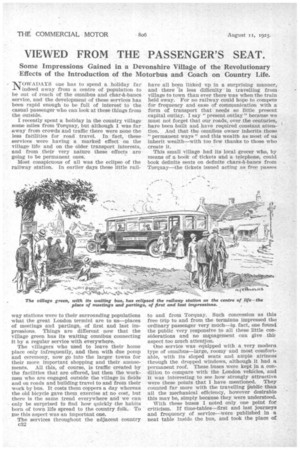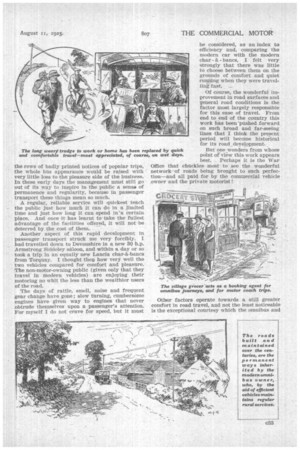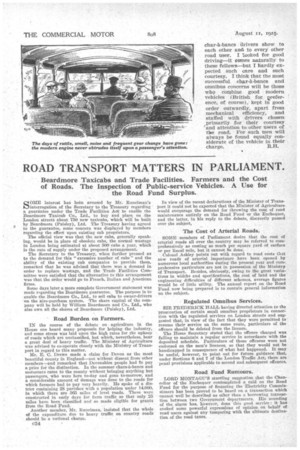VIEWED FROM THE PASSENGER'S SEAT.
Page 16

Page 17

Page 18

If you've noticed an error in this article please click here to report it so we can fix it.
Some Impressions Gained in a Devonshire Village of the Revolutionary Effects of the Introduction of the Motorbus and Coach on Country Life.
NOWADAYS one has to spend a holiday far indeed away from a centre of population to be out of reach of the omnibus and char-it-bancs service, and the development of these services has been rapid enough to be full of interest to the casual passenger who can look at these things from the outside.
I recently spent a holiday in the country village some miles from Torquay, but although I was far away from crowds and traffic there were none the less facilities for road travel. In fact, these services were having a marked effect on the village life and on the older transport interests, and from their very nature these effects are going to be permanent ones. Most conspicuous of all was the eclipse of the railway station. In earlier days these little rail way stations were to their surrounding populations what the great London termini are to us—places of meetings and partings, of first and last impressions. Things are different now that the village green has its waiting omnibus connecting it by a regular service with everywhere.
The villagers who used to leave their home place only infrequently, and then with due pomp and ceremony, now go into the larger towns for their more important shopping and their amusements. All this, of course, is traffic created by the facilities that are offered, but then the workmen who are engaged outside the village in fields and on roads and building travel to and from their work by bus. It costs them coppers a day whereas the old bicycle gave them exercise at no cost, but there is the same trend everywhere and we can only be surprised to find how quickly the habits born of town life spread to the country folk. To me this aspect was an important one.
The services throughout the adjacent country c32 have all been linked up in a surprising manner, and there is less difficulty in travelling from, village to town than ever there was when the train held sway. For no railway could hope to compete for frequency and ease of communication with a form of transport that needs so little present capital outlay. I say "present outlay" because we must not forget that our roads, over the centuries, have been built and have required constant attention. And that the omnibus owner inherits these " permanent ways" and this wealth as most of ui inherit wealth—with too few thanks to those who create it.
This small village had its local grocer who, by means of a book of tickets and a telephone, could book definite seats on definite chars-A-bancs from Torquay—the tickets issued acting as free passes to and from Torquay. Such concession as this free trip to and from the terminus impressed the ordinary passenger very much—in fact, one found the public very responsive to all these little considerations and no mknagement can give this aspect too much attention. One service was equipped with a very modern type of omnibus—large, roomy and most comfortable, with its sloped seats and ample airiness through the dropped windows, although it had a permanent roof. These buses were kept in a con-, dition to compare with the London vehicles, and it was interesting to see how strongly attractive were these points that I have mentioned. They counted far more with the travelling public than all the mechanical efficiency, however desirable this may be, simply because they. were understood. With these buses I noted only one point for criticism. If time-tables—first and last journeys and frequency of service---were published in a neat table inside the bus, and took the place of the rows of badly printed notices of popular trips, the whole bus appearance would be raised with very little loss to the pleasure side of the business. In these early days the management must still go out of its way to inspire in the public a sens of permanence and regularity, because in passenger transport these things mean so much.
A regular, reliable service will quickest teach the public just how much it can do in a limited time and just how long it can spend in'a certain place. And once it has learnt to take the fullest advantage of the facilities offered, it will not be deterred by the cost of them.
Another aspect of this rapid development in passenger transport struck me very forcibly. I had travelled down to Devonshire in a new 3Q h.p. Armstrong Siddeley saloon, and within a day or so took a trip in an equally new Lancia char-A-banes from Torquay. I thought then how very well the two vehicles compared for comfort and pleasure. The non-motor-owning public (given only that they travel in modern vehicles) are enjoying their motoring no whit the less than the wealthier users of the road.
The days of rattle, smell, noise and frequent gear change have gone ; slow turning, cumbersome engines have given way to engines that never obtrude themselves upon a passenger's attention. For myself I do not crave for speed, but it must be considered, as an index to efficiency and, comparing the modern car with the modern char banes, I felt very strongly that there was little to choose between them on the grounds of comfort and quiet running when they were travelling fast.
Of course, the wonderful improvement in road surfaces and general road conditions is the factor most largely responsible for this ease of travel. From end to end of the country this work has been pushed forward on such broad and far-seeing lines that I think the present period will become historical for its road development.
But one wonders from whose point of view this work appears best. Perhaps it is the War Office that chuckles most to see the wonderful network of roads being brought to such perfection—and all paid for by the commercial vehicle owner and the private motorist !
Other factors operate towards a still greater comfort in road travel, and not the least noticeable is the exceptional courtesy which the omnibus and char-l-bancs 'drivers show to each other and to every other road user. I 'looked for good driving—it comes naturally to these fellows—but I hardly expected such care and such courtesy. I think that the most successful char-A-banes and omnibus concerns will be those who combine good modern vehicles (British for greference, of course), kept in good order outwardly, apart from mechanical efficiency, and staffed with drivers chosen primarily for their courtesy /and attention to other users of the road. For such men will always be found equally considerate of the vehicle in their charge. R.H.






























